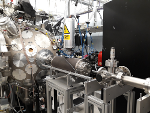Changes between Version 4 and Version 5 of Communication/Publications/2021/GL_Beam_Experiment
- Timestamp:
- Apr 16, 2021, 8:26:49 AM (5 years ago)
Legend:
- Unmodified
- Added
- Removed
- Modified
-
Communication/Publications/2021/GL_Beam_Experiment
v4 v5 4 4 5 5 '''Abstract''':: 6 >''An electron plasma lens is a cost-effective, compact, strong-focusing element that can ensure efficient capture of low-energy proton and ion beams from laser-driven sources. A Gabor lens prototype was built for high electron density operation at Imperial College London. The parameters of the stable operation regime of the lens and its performance during a beam test with 1.4 \,MeV protons are reported here. Narrow pencil beams were imaged on a scintillator screen 67\,cm downstream of the lens. The lens converted the pencil beams into rings that show position-dependent shape and intensity modulation that are dependent on the settings of the lens. Characterisation of the focusing effect suggests that the plasma column exhibited an off-axis rotation similar to the $m=1$diocotron instability. The association of the instability with the cause of the rings was investigated using particle tracking simulations.''\\6 >''An electron plasma lens is a cost-effective, compact, strong-focusing element that can ensure efficient capture of low-energy proton and ion beams from laser-driven sources. A Gabor lens prototype was built for high electron density operation at Imperial College London. The parameters of the stable operation regime of the lens and its performance during a beam test with 1.4 MeV protons are reported here. Narrow pencil beams were imaged on a scintillator screen 67 cm downstream of the lens. The lens converted the pencil beams into rings that show position-dependent shape and intensity modulation that are dependent on the settings of the lens. Characterisation of the focusing effect suggests that the plasma column exhibited an off-axis rotation similar to the ''m=1'' diocotron instability. The association of the instability with the cause of the rings was investigated using particle tracking simulations.''\\ 7 7 8 8
